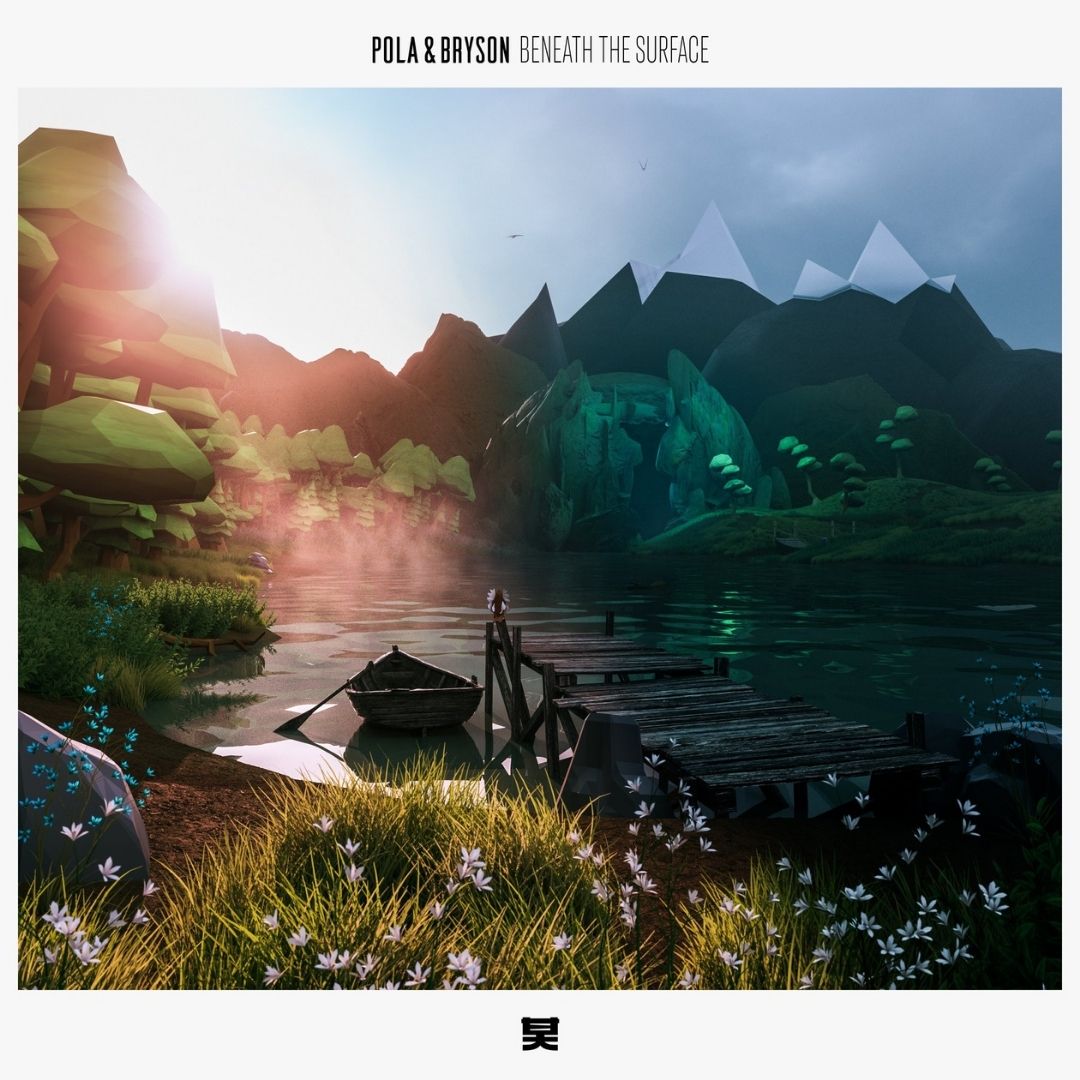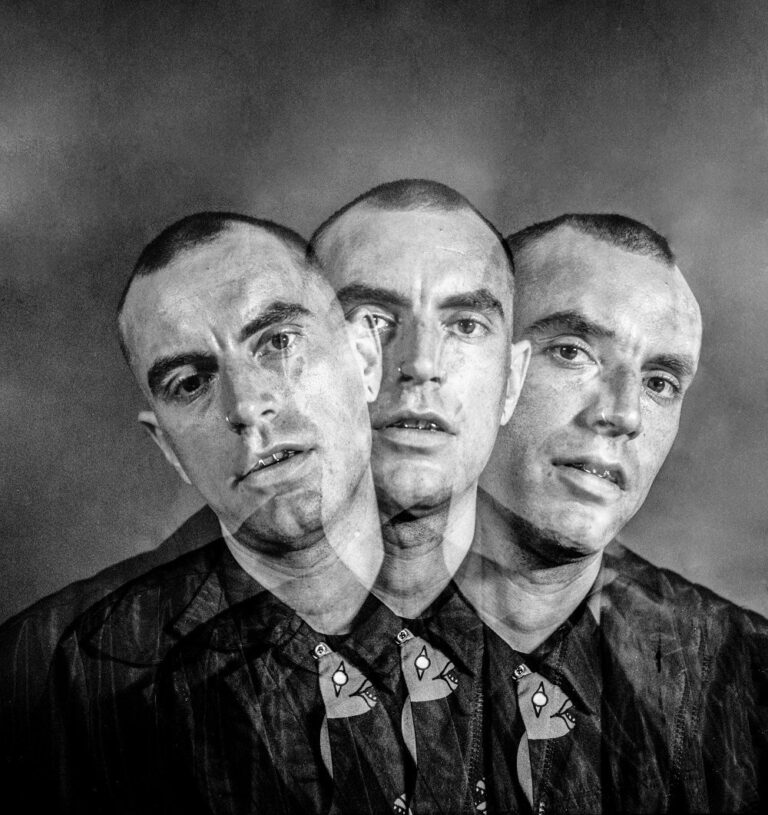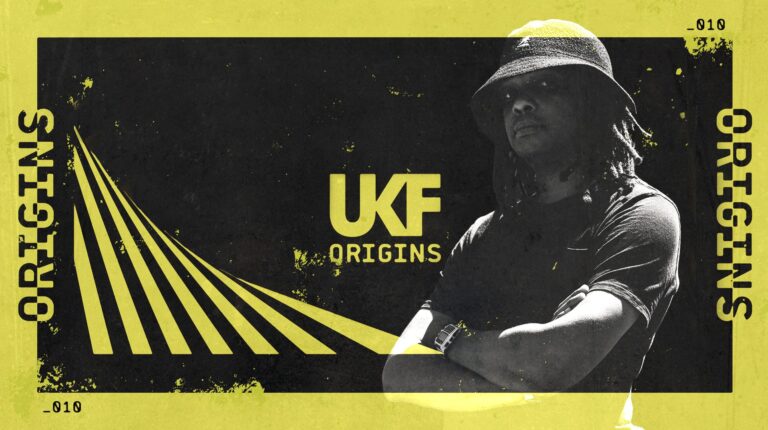Fresh-faced but highly experienced duo Pola & Bryson have just released their third full album – Beneath The Surface.
Their second album on Shogun Audio, Beneath The Surface weighs in at 15 tracks and shows off their versatility as producers of both super-soulful liquid, and deeper, darker rollers. Some of it you’d expect to hear at peak-time in Fabric, and other tracks you might find on a wind-down playlist. But it’s all tied together by masterful production and a detailed concept which runs throughout.
A landscape, visualised as four different sections was conceptualised by the pair to act as inspiration when writing the album. Each section representing different mental and emotional states:
- Shinrinyoku, a dense, peaceful forest environment. Peace, rebirth, growth.
- Mangata, the edges of a cold, misty lake. Secret, unsettled, doubt.
- Toska, a dark and endless cave. Melancholy, depth, darkness.
- Yuugen, a vast and epic mountain range.Open, light, resolution.

With the majority of the writing occurring during covid times, the concept provided much needed inspiration, and a reference point to guide their studio sessions. It also gave collaborators more context when writing vocals or creating a certain sound.
In isolation, the tracks stand alone wonderfully – DJs will be drawing for them in their sets for a long time. But as a whole, combined with the artwork, animations, and concept; the album is an immersive, carefully crafted sonic and visual journey.
UKF sat down with Jack Pola and Harry Bryson to discuss what’s beneath the surface on their latest output.
Fresh off the album release and back on the road. How are you guys feeling?
Harry: Really positive. Feedback from the album has been incredible.
Jack: Yeah, it’s been very pleasant. The album was not specifically written for the club, but to then be able to go out and play in clubs, and see that people really like the tunes is great. We’ve been blown away by how positive the response has been from people.
Harry: Yeah the feedback, not just from big DJs, but the fans and people online has been incredible.
Jack: Some people from countries that we had no idea that our music reached. We had a message from a bloke in Pakistan, sharing his copy of the box set. I had no idea that our music got out there, but great to see!
You got to tour New Zealand recently and test out a few tunes earlier this year, too. How did that go?
Harry: Yeah I did. I got to test out pretty much the whole album. The reception was great there as well, especially in Auckland.
Jack: Before you left for that tour, there were a couple of tunes that you were unsure of as to whether they were finished or needed to be switched up a little bit. And then when you returned home you said, ‘Nah, they’re done.’
Clearly a huge amount of thought and consideration has gone into crafting this masterpiece. But before that, let’s take things way back and get an understanding of your musical backgrounds…
Jack: My parents encouraged me to learn a musical instrument at a young age, so I learned the trumpet. From there, I was always interested in music, so it was always music subjects at school and college. Eventually, I discovered computer music and producing on your own, rather than playing in a band. Then it’s shortly after I left college and a couple of years into working, that I was introduced to Harry.
Harry: As for me, my mum and dad had a piano in their house – and that’s where I started just improvising on. After that, I got really into drumming, and my parents bought me a kit. I played in some bands and played some gigs. And then, when I was around 14 I got into producing – a couple of years later I met Jack.
Jack: And so one of the guys from Data 3, Alex, used to make dubstep with Harry back in the day. I’d previously met Alex at this hippie version of scouts, many moons ago. He knew that we were both really into drum & bass, and so when I came up to visit Alex in West Yorkshire one time, he suggested we meet each other and work on some tunes together. About a year later, I moved up there to try and get away from London and the big city for a while. That’s where me and Harry pretty much lived together, writing music for like six straight months. It was bad music.
Harry: It was terrible!
Jack: Yeah it was really cheesy stuff. But it was almost like a six month ‘writing camp’ – learning what we liked about each other’s production styles, what our skills and tastes were musically. I think that period of writing a bunch of stuff that never saw the light of day gave us a springboard for when Harry eventually moved down to London. We thought, okay, let’s join forces and do this together, because the music just sounded more interesting when we were working together. There was a merging of sounds and styles. That was about 10 years ago. About six years since we started Pola & Bryson. Man, it’s been a while.
And now you’re three albums deep. With the latest, there’s a big focus on concept and theme. Why is having a concept important for writing an album?
Harry: I don’t actually think it’s necessarily important. But for us it was something different, because we’ve already done 2 albums prior. Originally we wanted to use the concept as an aid to write the music.
We didn’t make the visual concept first, we were just using imagery to help write, and tap into for inspiration. We find that when we look at pictures of landscapes, or we’re in a certain environment – we’ll feel certain things and it will help us write music in a different way. So we used that imagery idea when we started writing this album, and that grew into the actual result of the full album with the concept of each different theme.
So those 4 main themes or landscapes you created – you’d be using those to guide your production sessions?
Jack: Yeah. We didn’t foresee this, but it’s good that we had the concept in motion way before lockdown. Because as we were trying to finish up this album – adding in all those extra elements and really fleshing out the tracks – that’s the point where normally you’d be getting inspiration from touring, being in different places, and hearing all types of music. Obviously we were now lacking that. So thankfully we’d already started building on this concept – we became very reliant on it to finish the album. Lockdown was really the kick to double down on the concept, and really make it what the whole album is going to be about.
I’d agree with Harry that it’s not essential to have a concept. But it was something that we considered, to do something a little bit different.
Harry: Yeah it was something to inspire us originally more than anything.
Jack: Exactly. We don’t want to stop doing albums, it’s something we really love doing. But we know that writing 15 tracks, or a large body of work – it’s hard to sell that to people every couple of years. I think doing a concept has reinforced the idea that an album can still be us, but also be so different every time it comes around. It’s also a really good way of pushing yourself out of your comfort zone. It makes you do something a little bit different and unconventional. We’ll probably be doing it again in some capacity.
What was happening in your lives to inspire the concept and writing?
Jack: There wasn’t anything really going on with us personally or emotionally. The concept of it is about your emotional journey through a struggle, whatever that may be. I think everyone in some capacity has gone through that. Even if it’s like a fight with a friend for example, that relationship can slowly, gradually descend into darkness, and when you’re in that lowest point you feel like it’s all up-hill from here. That can relate to any kind of personal or emotional struggle.
Harry: We just knew we wanted to write an album with different emotions behind it. And the imagery helps bring out those emotions for us. Then the final part of that was just putting those themes in order, like a storyboard. There’s four different emotional ‘themes’ and the order of them represents a mental struggle, like depression for example. Neverend is a good tune for that example because it expresses how you might feel things are going never end when you’re getting down to that really dark place – but then, they lift back up again.
Jack: It’s always darkest before dawn.
Are you drawing musical inspiration outside of drum & bass?
Jack: Lots.
Harry: I can’t say I listened to any drum & bass in the last year, even before lockdown. We immersed ourselves in other types of music, because we didn’t want to get too inspired by other drum & bass tracks. We obviously listen to them if we’re playing gigs, but we took the time to listen to a lot of different music – music like Floating Points, lots of atmospheric music…
Jack: Lots of different dance music as well. I don’t think it was a conscious thing either like, ‘I’m not going to listen to drum & bass’ – it just felt like, whilst there wasn’t a clubbing environment, we’ve found ourselves listening to other music; live music, lo-fi hip-hop, all sorts of stuff… primarily, everything except drum & bass. There were a lot of things that we picked out and shared with one another where it was like, ‘That’s really lovely, let’s try something like that in the album.’
Harry: Just listening to other music, subconsciously influences what we make without even realising it. That’s definitely apparent with the album. Listening back I can hear some of the stuff we’ve been listening to, like all the ambient stuff. We’ve actually made a playlist of non-drum and bass stuff that’s influenced the album, which we’ll be sharing.
The album name Beneath The Surface, where does that come from?
Harry: Well there are so many layers to the album – the imagery, the themes, the feelings, and the story of the themes – it was difficult to choose a name but, Beneath The Surface just rolled off the tongue. I think my girlfriend actually said it. I thought, that’s perfect, because it’s like, all is not what it seems on the surface, dig a little deeper and you’ll find much more.
Jack: She named our second album for us too – I think she’s very good at understanding what’s going on in our head and condensing it.
She must be due some royalties then.
Harry: Haha, definitely. Yeah I think that title just ticked all the boxes of all the layers involved with this project.
Anaesthetist with Strategy stands out a lot to me. How did that one come about?
Harry: We had this tune for ages actually. It was originally called ‘Monks’, which we made pre-concept, and then adapted it for the album.
Jack: It was in Friction’s inbox for a very long time as a work-in-progress.
Harry: We were unsure as to whether we were going to finish it or do anything with it. And then, an amazing thing happened – Strategy hit us up! It must’ve been March 2020, he came out of nowhere asking if we had any tunes, and that he’d love to work with us. We were like ‘Yeeeah! Strategy!”. Then straight away we sent him ‘Monks’, and he sent over a rough demo within hours.
Jack: It’s a tune where we weren’t really sure how much further we could take it, but the moment there’s an opportunity to collaborate with an artist, it can instantly set off alarm bells of what you could do, and where you could take it.
Harry: And we told him about the concept of that particular section too. Because we knew if it’s going to go in the album, it’s going to go in Toska which is the dark section. We did that with all the featured artists actually – we told them about the concept and theme and let them interpret it in their own way.
You’re known for some of the most soulful sounding drum & bass, but you’ve got a bunch of hefty ones in your catalogue as well. Do you find there’s any rhyme or reason to your studio session that takes you in either direction?
Harry: Not really, unless we’ve got a concept! Usually we’ll just meet up and be like, ‘Right what shall we make? But we could start off making a really soulful liquid tune, and then it ends up being a gritty, dutty banger.
Jack: I do feel like, the later in the day we start on a tune, the more likely it is to be a deep chilled liquid roller. But there’s no rules really.
You also dabble in different genres and tempos in this, and previous albums. Could you see yourselves diving further into that? Like how your label mates GLXY are doing with their garage sets and releases.
Harry: Yeah we’ve got loads of garage tunes, house tunes…
Jack: That kind of, ambient-electro-techno-house … I can’t really explain it.
Harry: Just Pola & Bryson at 120BPM really.
Jack: But anyway, I think there’s definitely room for us to be doing that sort of stuff in the future, but we still have so much fun writing drum & bass. Once you start to slow tunes down, you’ve got a lot more space to play with amongst those kicks, to add rhythm and shuffle and effects. But doing that at drum & bass tempos is more challenging and fun, and so I don’t think we’re gonna stop doing that any time soon, because it pushes you to do some weirder stuff.
Harry: It is more challenging, yeah, and that’s why sometimes it’s nice to produce in those slower tempos because you can really concentrate on the vibe and ignore the production somewhat.
Can drum & bass be a bit rigid sometimes?
Jack: I think it’s sometimes restrictive because there’s a lot of people that like what it already is, and they don’t want to hear too much change from the formula. So for us, that’s the challenging thing – how can we push ourselves to write something that is different enough to be interesting, without people writing us off and saying, ‘Oh no, that’s weird, I don’t like that, stop it!’
Harry: And it has to be something that we both love.
What’s next for you guys?
Jack: Good question! I think all we know is that there will definitely be more albums in the future.
Harry: But that might not be for a while now. We’ll have plenty of music and other releases out before then though.
Any final things to plug?
Jack: I just want to say thank you to all the people who have supported the album. I don’t usually get stressed or terrified before releases – but leading up to this album I was really panicky. But now I’m not, because there’s been so many lovely responses from people, so many nice messages – it’s been great.
Harry: And big ups to the team at Shogun, and of course Army of Few – the guys who created the artwork and animations. They smashed it on that.
Pola & Bryson – Beneath The Surface is out now on Shogun Audio
Follow Pola & Bryson: Facebook / Soundcloud / Instagram / Twitter

